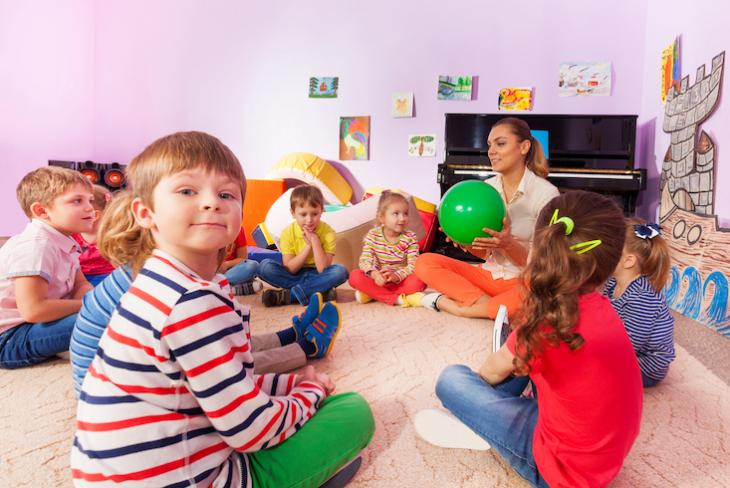If there’s one thing that will make your life easier as an English teacher, it would be learning some fun TEFL games for young learners.
While your TEFL certification course was focused on the more practical and serious side of teaching, the truth is that games are a lifesaver in any children’s classroom.
Games are guaranteed to bring a dash of magic to your classroom.
They are a great way to motivate, reward, have fun and make your students feel excited about being in class.
Plus, they are a great way to teach!
Young learners can become so involved with the in-class games that they start to learn without even realizing it, while you have a great time teaching English in the process.
Here are some of our favorite need-to-know TEFL games:
- Taboo
- Bingo
- Stop the bus
- Hangman
- What’s missing?
1. Taboo
To play Taboo, pick one student from the class and ask them to step to the front where you will secretly whisper a vocabulary word in their ear.
Tip: pick a word that you want to revise from a previous class.
Your student must then explain the word, without saying it, while the rest of the class guesses what it is.
Of course, the fastest student to guess the correct answer wins a point!
You can adapt the basic premise of this game in all sorts of ways! Instead of describing the word, students could draw or mime it.
You could even divide the class into teams so that they are playing against each other.
For more advanced levels, after the word has been guessed, offer up extra points for any student who can spell the word or use it correctly in a sentence.

2. Bingo
Bingo is an old classic for a reason.
You could play with numbers or try Bingo with letters, animals, vocabulary words, past tense verbs… the list is truly endless.
If you want your students to play animal Bingo, you might want to specify a theme before starting, such as farm animals or pets.
Instead of printing off your own Bingo boards, ask your students to draw grids and fill in the squares themselves.
Depending on the student’s levels, you can let them know whether you want them to draw the animals or write the animal names on their grids.
Then you’re ready to play!
Here’s a top tip: if you’re acting as the caller, make sure you write down each call so you don’t lose track of where you’re at in the game.
The more advanced students can also help out by acting as the caller.
3. Stop the Bus
Students will love playing Stop the Bus.
To play, divide your students into groups and ask them to draw six columns on a piece of paper. At the top of each column, they will then write a category you have chosen.
For example, you might choose “things you can eat” as a category or “things in the sea.” Think about your student’s level and the vocabulary they are familiar with.
This game should help them revise their general vocabulary and work together as a team.
To play, the teacher calls a letter and the students must write something that begins with that letter for each category. When the fastest team finishes, they shout “Stop the Bus,” and all teams must put their pens down.
Count how many correct answers each team got and move on to the next round!
You can also mix this game up by playing it on the whiteboard. Write one category on the board and ask students to write as many related words as possible.
For super energetic classes, you could also turn the game into a running relay!

4. Hangman
Another old classic, Hangman, can really help students learn letter sounds and revise spelling.
To start, choose a vocabulary word that your students have learned in a previous lesson.
Next, draw dashes on the board representing each letter of the word you have chosen.
Students must then guess the letters in the word. When the answer is incorrect, the teacher draws part of the Hangman on the board. The class wins if they guess the word before the Hangman is complete.
This is the perfect activity for lower-level students.
After all, students will naturally engage more when the lessons are digestible and fun.
5. What’s Missing?
Normally, this game is played with objects placed on a tray that students must then memorize. After looking at the objects, students close their eyes while one is removed, and when they open them they must guess what is missing.
Try playing this game with images to test students’ vocabulary, or with words themselves written on flashcards.
Make the game harder using word pools, such as verbs or food, and introducing an “odd-word-out” that students have to identify.
Top tip: ask students to make their own flashcards with the new words and images which you can then explain for ten minutes at the end of every lesson.
You can easily play, ‘What’s Missing?’ as a revision exercise anytime you have a spare 15 minutes, or need a game to liven things up in the class.
Get ready to play!
It’s time to get playing with your kids.
When you add games to your lesson plan, your teaching job will get a lot more fun.
In time, you’ll find you can adapt almost any game you know and turn it into an ESL learning game.
Games are always a great opportunity to learn and have fun, but also to teach important lessons about classroom behavior.
Ensure that everyone is taking turns, following rules, listening to the teacher and each other.
These skills are all crucial for everyone to learn new vocabulary and have a good time.



